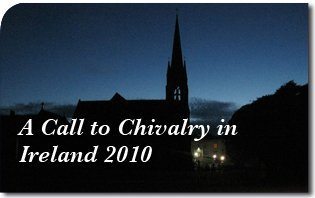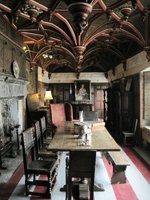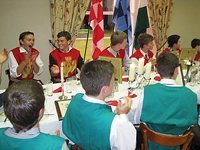 From July 4-11 the Irish Society for Christian Civilization held their 4th annual Call to Chivalry Camp. As in previous years, the program was held in the peaceful atmosphere of Mount St. Joseph’s Cistercian Abbey in Roscrea, Co. Tipperary.
From July 4-11 the Irish Society for Christian Civilization held their 4th annual Call to Chivalry Camp. As in previous years, the program was held in the peaceful atmosphere of Mount St. Joseph’s Cistercian Abbey in Roscrea, Co. Tipperary.
This year’s attendance with fathers, sons and counselors included nearly thirty participants. During the week, the program consisted of daily Mass, daily recitation of the Holy Rosary, Benediction of the Holy Eucharist, informative meetings on historical, religious and cultural topics, indoor and outdoor games, a treasure hunt, outings to historical and cultural places and a medieval banquet for families, friends and participants in this year’s program. Besides Irish participants, boys from around the globe came for this year’s activities. Young men from Germany, Lithuania, Austria, United States, Scotland and England made their way to the old Cistercian Abbey.

Meetings were given on a wide range of topics. Mr. Julio Loredo from Italy enlightened the participants on the concept of what a crusade is and where the crusade truly had its origins. Not like most people suppose, the idea of a crusade actually originated during the conversion of the Roman Empire under the Emperor Constantine. Mr. Loredo also gave a meeting on the great Catholic leader from Brazil, Prof. Plinio Corrêa de Oliveira, a man many refer to as the crusader of the twentieth century.
On the last day of the program, Mr. Loredo closed the session of meetings with a call to chivalry for all the participants. In a clear and accessible way, Mr. Loredo showed through an historical analysis what it meant to be a crusader in the past, and what it means to be a twenty-first century crusader. He mentioned that to be a crusader today does not mean to pick up arms and fight physically, but to be active in opposing the many errors of our times and to defend the Church against Her enemies. He convoked the participants to give themselves to these high ideals and not sit back and “enjoy” life in comfort with indifference to the destruction of Christian civilization going on around them.
Other meetings included a presentation on “Sir William Wallace and True Freedom” given by Mr. Neil McKay from Scotland. The great Scottish hero was shown in a masterful way as a man being truly free, because he sacrificed himself and his life for a high ideal. Mr. McKay also gave presentations on the Sacred Heart of Jesus and the angels. Mr. McKay showed how, just as the angels had to make a decision to follow God or Satan, we also are faced with the same battle on a daily basis.
Mr. Byron Whitcraft from the United States was also present. Mr. Whitcraft gave meetings on a few different subjects. His first meeting was on Devotion to Our Lady: its importance and what it means for our times. Mr. Whitcraft showed how being devoted to Our Lady today means in quoting Prof. Plinio Corrêa de Oliveira “to strive so that the things of this world reflect God in this life, and thus guide souls to eternal life.” In other words one must defend Christian culture and civilization. It is to be truly devoted to Our Lady.
Another talk was presented by Mr. Kenneth Murphy on chivalry in today’s world. In this presentation, he showed many clips of young men going to the streets defending the values of Christian civilization by opposing same-sex “marriage” and other such issues. Mr. Henry Creechan gave a presentation on the illogic of the theory of evolution. He showed the flaws both scientific and philosophical of this theory so accepted in universities throughout the world.
During the camp, daily mass was a focal point, which nourished the camp members with the Bread of Angels. Without this, the camp would not have been possible. A warm gratitude was then given to the priests that made this possible. Fr. Cunningham, Fr. Cahill and Cannon Lebocq all sacrificed time in their busy schedules to help in this essential part of the spiritual life. Towards the end of the camp, Fr. Cunningham bestowed the scapular of Our Lady of Mount Carmel on the participants that had not been enrolled yet.
Outings to historical places of interest included a walking tour of historic Limerick and a visit to the Hunt Museum. At the Hunt Museum, the camp members were able to see fine works of art such as the oldest medieval Irish crosier and miter, which survived the pillage during the Protestant revolt. They also saw the original decorative cross used by Mary Stuart shortly before her execution. On another day, the camp journeyed to visit Bunratty Castle and Folk Park. The participants enjoyed both outings taking a special interest in Bunratty Castle’s remarkable preservation and splendid furnishings.

As always, the medieval games were a favorite of the participants. As has been in the past few years, the games were inundated by constant rain. This did not deter, however, the enthusiasm and vigor in which the participants played. Rain was not an obstacle for either side. After the games, the Medieval banquet commenced. As last year, the camp was honored to have the presence of Abbot Richard Purcell who was elected just one year ago. At the end of the meal, a castle cake was brought in to the banquet hall, and a framed copy of the Ten Commandments of Chivalry was given to each one who participated in this year’s program.
The same evening, Abbot Purcell helped bring the camp to a close with a solemn benediction of the Blessed Sacrament and recitation of the Holy Rosary. The next morning the participants departed full of enthusiasm and ready for the many struggles of everyday life. As the French say to bid farewell is to “die” a little, therefore, the parting was sad but all knew that fortified by the sacraments of Holy Mother the Church and in Our Lady’s service each will never lose in this great crusade of the twenty-first century. What does that service mean? As the crusader of the twentieth century once said:
“In our times, what does service to Our Lady mean? It means saving souls by all possible legitimate means, among which we want to accentuate one: to take all things, to order them according to this spirit and to build Christian culture and civilization. Because under a certain aspect, these are nothing but the disposition of things so that they reflect God in this life, and thus guide souls to eternal life. To be consecrated to Our Lady and to serve her, means to sustain, promote and defend culture and civilization from its opponents.” Plinio Corrêa de Oliveira

